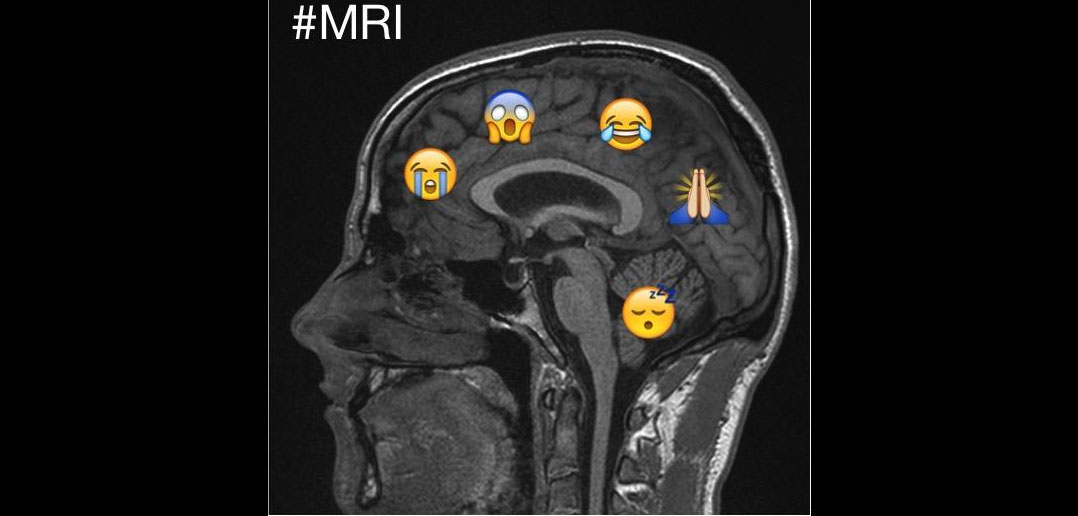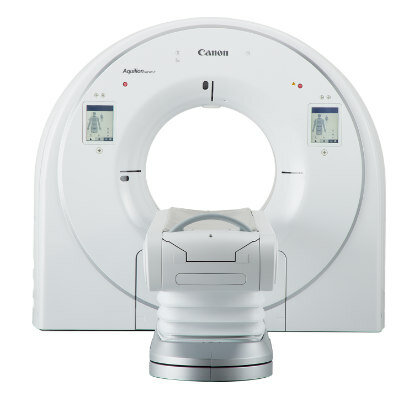Research Shows MRI Patients’, Their Family and Friends’ Reactions on Twitter Provide Useful Feedback
|
By MedImaging International staff writers Posted on 04 Nov 2015 |

Image: MRI of Johnathan Hewis' brain. Mr. Hewis was quoted as saying, “Had a lovely nap in the MRI machine” (Photo courtesy of Johnathan Hewis).
The results of a new study have shown that tweets can give clinicians useful feedback about patient experiences during Magnetic Resonance Imaging (MRI) imaging exams.
The study was published in the December 2015, issue of the Journal of Medical Imaging and Radiation Sciences and was carried out by Johnathan Hewis, MSc, investigator, Charles Sturt University, (NSW, Australia). The research analyzed 464 tweets related to MRI on the social networking site Twitter during one month. In the tweets patients that underwent an MRI exam shared their experiences with friends, and family. The tweets were grouped according to three subjects, MRI appointment, scan experience, and diagnosis. The researchers also found tweets relating to the cost of the exam, claustrophobia, noise, and restricted freedom of movement during the exams. Patients sometimes sent messages of praise to clinicians, or messages of thanks for good results, while friends and family used tweets to support patients with prayers, and messages of strength. Some patients were anxious about various aspects of an MRI, and were stressed by the possibility of negative results. Some patients however also appreciated the privacy of an MRI exam or the chance to take a nap. The practice of allowing patients to choose their own music during an exam was confirmed as a simple intervention that could help provide familiarity in a 'terrifying' environment,’ and that could alleviate anxiety during an MRI. The tweets proved to be a valuable tool that could help clinicians improve the MRI experience for patients
Messages on the Twitter network are used by 19% of the adult population in the US in 2014, nearly all by mobile phone.
Johnathan Hewis, said, "The findings of this study indicate that anticipatory anxiety can manifest over an extended time period and that the focus can shift and change along the MRI journey. An appreciation of anxiety related to results is an important clinical consideration for MRI facilities and referrers. MRI patients do tweet about their experiences and these correlate with published findings employing more traditional participant recruitment methods. This study demonstrates the potential use of Twitter as a viable platform to conduct research into the patient experience within the medical radiation sciences.
Related Links:
Charles Sturt University
The study was published in the December 2015, issue of the Journal of Medical Imaging and Radiation Sciences and was carried out by Johnathan Hewis, MSc, investigator, Charles Sturt University, (NSW, Australia). The research analyzed 464 tweets related to MRI on the social networking site Twitter during one month. In the tweets patients that underwent an MRI exam shared their experiences with friends, and family. The tweets were grouped according to three subjects, MRI appointment, scan experience, and diagnosis. The researchers also found tweets relating to the cost of the exam, claustrophobia, noise, and restricted freedom of movement during the exams. Patients sometimes sent messages of praise to clinicians, or messages of thanks for good results, while friends and family used tweets to support patients with prayers, and messages of strength. Some patients were anxious about various aspects of an MRI, and were stressed by the possibility of negative results. Some patients however also appreciated the privacy of an MRI exam or the chance to take a nap. The practice of allowing patients to choose their own music during an exam was confirmed as a simple intervention that could help provide familiarity in a 'terrifying' environment,’ and that could alleviate anxiety during an MRI. The tweets proved to be a valuable tool that could help clinicians improve the MRI experience for patients
Messages on the Twitter network are used by 19% of the adult population in the US in 2014, nearly all by mobile phone.
Johnathan Hewis, said, "The findings of this study indicate that anticipatory anxiety can manifest over an extended time period and that the focus can shift and change along the MRI journey. An appreciation of anxiety related to results is an important clinical consideration for MRI facilities and referrers. MRI patients do tweet about their experiences and these correlate with published findings employing more traditional participant recruitment methods. This study demonstrates the potential use of Twitter as a viable platform to conduct research into the patient experience within the medical radiation sciences.
Related Links:
Charles Sturt University
Latest MRI News
- Low-Cost Whole-Body MRI Device Combined with AI Generates High-Quality Results
- World's First Whole-Body Ultra-High Field MRI Officially Comes To Market
- World's First Sensor Detects Errors in MRI Scans Using Laser Light and Gas
- Diamond Dust Could Offer New Contrast Agent Option for Future MRI Scans
- Combining MRI with PSA Testing Improves Clinical Outcomes for Prostate Cancer Patients
- PET/MRI Improves Diagnostic Accuracy for Prostate Cancer Patients
- Next Generation MR-Guided Focused Ultrasound Ushers In Future of Incisionless Neurosurgery
- Two-Part MRI Scan Detects Prostate Cancer More Quickly without Compromising Diagnostic Quality
- World’s Most Powerful MRI Machine Images Living Brain with Unrivaled Clarity
- New Whole-Body Imaging Technology Makes It Possible to View Inflammation on MRI Scan
- Combining Prostate MRI with Blood Test Can Avoid Unnecessary Prostate Biopsies
- New Treatment Combines MRI and Ultrasound to Control Prostate Cancer without Serious Side Effects
- MRI Improves Diagnosis and Treatment of Prostate Cancer
- Combined PET-MRI Scan Improves Treatment for Early Breast Cancer Patients
- 4D MRI Could Improve Clinical Assessment of Heart Blood Flow Abnormalities
- MRI-Guided Focused Ultrasound Therapy Shows Promise in Treating Prostate Cancer
Channels
Radiography
view channel
Novel Breast Imaging System Proves As Effective As Mammography
Breast cancer remains the most frequently diagnosed cancer among women. It is projected that one in eight women will be diagnosed with breast cancer during her lifetime, and one in 42 women who turn 50... Read more
AI Assistance Improves Breast-Cancer Screening by Reducing False Positives
Radiologists typically detect one case of cancer for every 200 mammograms reviewed. However, these evaluations often result in false positives, leading to unnecessary patient recalls for additional testing,... Read moreUltrasound
view channel.jpg)
Diagnostic System Automatically Analyzes TTE Images to Identify Congenital Heart Disease
Congenital heart disease (CHD) is one of the most prevalent congenital anomalies worldwide, presenting substantial health and financial challenges for affected patients. Early detection and treatment of... Read more
Super-Resolution Imaging Technique Could Improve Evaluation of Cardiac Conditions
The heart depends on efficient blood circulation to pump blood throughout the body, delivering oxygen to tissues and removing carbon dioxide and waste. Yet, when heart vessels are damaged, it can disrupt... Read more
First AI-Powered POC Ultrasound Diagnostic Solution Helps Prioritize Cases Based On Severity
Ultrasound scans are essential for identifying and diagnosing various medical conditions, but often, patients must wait weeks or months for results due to a shortage of qualified medical professionals... Read moreNuclear Medicine
view channel
New PET Biomarker Predicts Success of Immune Checkpoint Blockade Therapy
Immunotherapies, such as immune checkpoint blockade (ICB), have shown promising clinical results in treating melanoma, non-small cell lung cancer, and other tumor types. However, the effectiveness of these... Read moreNew PET Agent Rapidly and Accurately Visualizes Lesions in Clear Cell Renal Cell Carcinoma Patients
Clear cell renal cell cancer (ccRCC) represents 70-80% of renal cell carcinoma cases. While localized disease can be effectively treated with surgery and ablative therapies, one-third of patients either... Read more
New Imaging Technique Monitors Inflammation Disorders without Radiation Exposure
Imaging inflammation using traditional radiological techniques presents significant challenges, including radiation exposure, poor image quality, high costs, and invasive procedures. Now, new contrast... Read more
New SPECT/CT Technique Could Change Imaging Practices and Increase Patient Access
The development of lead-212 (212Pb)-PSMA–based targeted alpha therapy (TAT) is garnering significant interest in treating patients with metastatic castration-resistant prostate cancer. The imaging of 212Pb,... Read moreGeneral/Advanced Imaging
view channelBone Density Test Uses Existing CT Images to Predict Fractures
Osteoporotic fractures are not only devastating and deadly, especially hip fractures, but also impose significant costs. They rank among the top chronic diseases in terms of disability-adjusted life years... Read more
AI Predicts Cardiac Risk and Mortality from Routine Chest CT Scans
Heart disease remains the leading cause of death and is largely preventable, yet many individuals are unaware of their risk until it becomes severe. Early detection through screening can reveal heart issues,... Read moreImaging IT
view channel
New Google Cloud Medical Imaging Suite Makes Imaging Healthcare Data More Accessible
Medical imaging is a critical tool used to diagnose patients, and there are billions of medical images scanned globally each year. Imaging data accounts for about 90% of all healthcare data1 and, until... Read more
Global AI in Medical Diagnostics Market to Be Driven by Demand for Image Recognition in Radiology
The global artificial intelligence (AI) in medical diagnostics market is expanding with early disease detection being one of its key applications and image recognition becoming a compelling consumer proposition... Read moreIndustry News
view channel
Hologic Acquires UK-Based Breast Surgical Guidance Company Endomagnetics Ltd.
Hologic, Inc. (Marlborough, MA, USA) has entered into a definitive agreement to acquire Endomagnetics Ltd. (Cambridge, UK), a privately held developer of breast cancer surgery technologies, for approximately... Read more
Bayer and Google Partner on New AI Product for Radiologists
Medical imaging data comprises around 90% of all healthcare data, and it is a highly complex and rich clinical data modality and serves as a vital tool for diagnosing patients. Each year, billions of medical... Read more



















